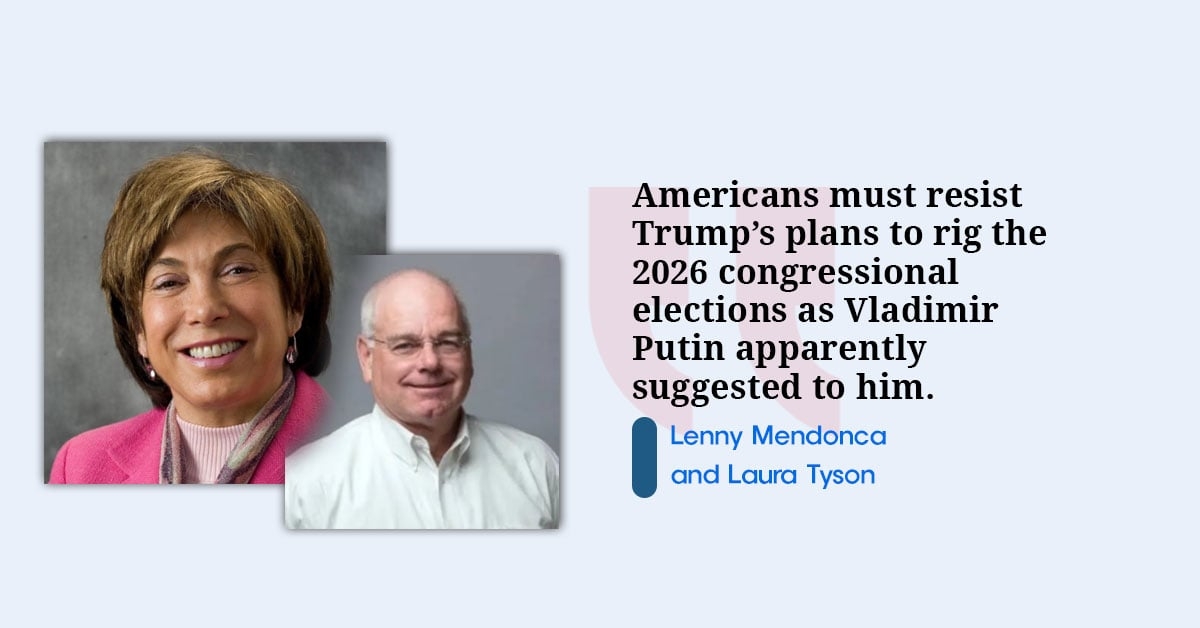

SAN FRANCISCO: At the explicit request of President Donald Trump, Texas Governor Greg Abbott is pursuing an unorthodox mid-decade redistricting of the state’s congressional map to ensure that Republicans win five additional seats in the next election.
This brazenly partisan move is yet another example of Trump’s assault on American democracy. It is worth recalling a previous such assault, when he begged Georgia Secretary of State Brad Raffensperger to throw the 2020 presidential election his way by “finding” 11,780 more votes. Unlike Abbott, Raffensperger rejected Trump’s unlawful demand and allowed Georgia’s voters to decide the election.
Gerrymandering – drawing the boundaries of electoral districts to create an unfair advantage for a particular party – obviously corrupts democracy. Voters are supposed to choose their representatives, but rigging the electoral map means that politicians choose their voters. Historically, voters of color have suffered the most from such machinations, which is why racial gerrymandering is prohibited under the Voting Rights Act (VRA) of 1965.
Although Abbott’s new voting map is likely to be challenged in court, these lawsuits will probably fail. In a 2019 case, the Supreme Court ruled that partisan gerrymandering was “beyond the reach of the federal courts.” And with the current Supreme Court fully committed to Trump’s authoritarian agenda, there is no chance that it will intervene to uphold the VRA.
What can Democrats do? As the only state large enough to offset Texas’s partisan gerrymandering, California is planning to fight fire with fire. California Governor Gavin Newsom previously called on Trump and his gubernatorial lackeys to refrain from “rigging of maps in red states.” But now that they have done just that, Newsom is pursuing a redistricting effort in his own state.
California has been a leader in nonpartisan redistricting. In 2008, California voters authorized the creation of an independent redistricting commission (comprising five Democrats, five Republicans, and four members unaffiliated with either party) when they passed the Voters FIRST Act. Then, in 2010, Californians delegated the actual drawing of congressional districts to the commission.
Since then, the commission has become the gold standard for nonpartisan redistricting. Newsom has proposed that all states adopt similar commissions to end gerrymandering once and for all, and a similar recommendation was included in the For the People Act of 2021 (which was blocked by a Republican filibuster in the Senate).
Newsom’s proposed redistricting requires approval from California voters on two separate but related ballots. The first would create a short-term exception to the commission’s role in establishing congressional districts for 2026-30, but only in the event that Republican-controlled states go through with their gerrymandering plans; the second would then authorize a temporary redistricting.
Thus, California’s response is fundamentally different from Abbott’s redistricting plan, which makes no effort to consult Texas voters. One poll found that 57% of Californians would approve Newsom’s ballot measures, with 35% opposed and 8% undecided. Moreover, the proposed changes are time-limited, proportional, and transparent. Accordingly, they meet the conditions for good governance on mid-decade redistricting as proposed by Common Cause, a nonpartisan organization dedicated to the defense of democracy (one of us is a member of its National Governing Board).
In a forthcoming article, Archon Fung, a professor of citizenship and self-government at Harvard Kennedy School, likens Newsom’s measure to the principles of “just war” by state actors. According to this philosophical doctrine, which goes back to St. Thomas Aquinas and St. Augustine, state conflict is just only if it meets a set of strict conditions. For example, such action must be taken for just reasons (such as restoring peace or defending against aggression), as a last resort, with proportionality, and with a reasonable chance of success.
Of course, the mid-cycle redistricting fight is not part a war; but it is part of a struggle in defense of democracy. Trump and Republicans in Texas (as well as Ohio, Indiana, Missouri, and possibly other states) are openly trying to rig the 2026 congressional elections and setting fire to the norms and processes that sustain American democracy. Newsom’s redistricting plan is a necessary and just response to an unjust provocation by an authoritarian president. It is the least bad option, and several other Democratic states, including New York (which also has an independent commission), have come to the same conclusion.
Voters hate gerrymandering. But because they still support democracy, they are willing to endorse aggressive, principled efforts to protect it. It is they who should have the final say, as will be the case in California. Tens of millions of Americans are deeply worried about Trump’s authoritarianism. They want to end gerrymandering, but they also recognize that the more urgent priority is to maintain a functioning democracy.
Americans must resist Trump’s plans to rig the 2026 congressional elections (not only through gerrymandering, but also by trying to meddle with voting procedures, as Vladimir Putin apparently suggested to him). The history of democratic backsliding makes clear that aspiring despots must be resisted early, before they can remove all checks on their power.
(Lenny Mendonca, Senior Partner Emeritus at McKinsey & Company, is a former chief economic and business adviser to Governor Gavin Newsom of California and chair of the California High-Speed Rail Authority. Laura Tyson, a former chair of the President’s Council of Economic Advisers during the Clinton administration, is a professor at the Haas School of Business at the University of California, Berkeley, and a member of the Board of Advisers at Angeleno Group.)
Copyright: Project Syndicate, 2025.